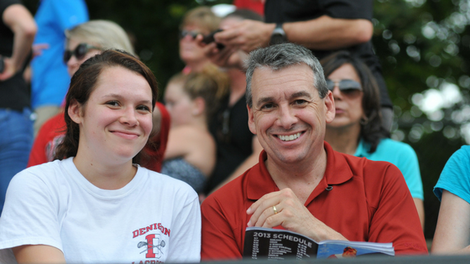
We often hear from parents that their sons and daughters don’t talk to them.
“Good luck getting her to tell you what’s going on.”
“Don’t be surprised if he doesn’t talk, he’s really shy.”
“I wish they would tell me what they need.”
When you have teens and pre-teens, these sentiments may feel all too common. Parents often have the best intentions and try so hard to talk to, guide, and support their kids. Even still, in working with youth athletes, we frequently see a disconnect in the communication between athletes and their parents. This gap can negatively impact athletes’ performance in their sport by:
- Increasing perceived pressure to do well, feelings of isolation, and thoughts like, "It's all on me"
- Decreasing feelings of being understood, perceived parental belief in their abilities, confidence, and motivation
So, where do you start closing the gap? One of the biggest areas of opportunity is in talking to teens and pre-teens about their goals in and out of sport. Most of them have something they are working on, or have at least thought about – admittedly maybe not in depth, but it’s on their mind. Regardless of the status of their goal, here’s the bottom line: to accomplish it, they are going to need you. Whether they need something small like providing encouragement or something big like a financial investment in their training and competition travel, your support and involvement as a parent matters.
Here are six strategies we use on a regular basis to help athletes open up and talk about their goals as well as what they need from you as parents:
- Right time, right place: Consider having your conversations at times and locations that your son or daughter will perceive to be safe and constructive, and let’s face it – not cheesy. Feel free to think outside the box, like taking a walk together instead of sitting around a table with pen and paper at the ready.
- Use “what” and “how” questions: Start your questions with either of these words to help avoid yes or no answers and therefore create a more open conversation. Avoid “why” questions as these can often put your son or daughter on the defensive and shut down their desire to continue talking.
- Say “tell me more”: Use. This. Phrase. It shows sincere interest (when paired with genuine facial expressions and body language, of course) and gives them permission to keep sharing.
- Leverage start, stop, continue: Ask for their input with the following questions: “What can I start doing to support you? Stop doing? Continue doing?”
- Be open to feedback, and act: If they struggle telling you what they need, be prepared to offer a few ideas, knowing that they may hate every last one of them. Once you collaboratively identify a realistic way you can support them in working on their goal, take action and stay accountable.
- Praise success by their standards: There’s not much worse than blanket statements like “way to go” and “good job”. Get to know how your son or daughter defines success, look for it, and praise them based on their strategy, effort, or skill to help them recognize a job well done and stay motivated.
Working with parents is a big part of how we support youth athletes through mental skills training. We value your input, perspective, and questions. Let us know how we can help!

Abby Keenan is a mental performance coach located in Dacula, GA. She helps athletes improve themselves and become mentally prepared to perform at their best when it matters most. To talk to Abby about working collaboratively with you and your son or daughter, contact us.
